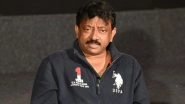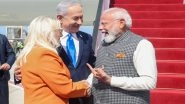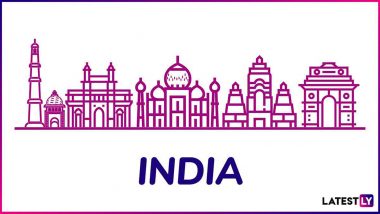Bengaluru, May 9 (PTI) After a high voltage campaign, it is now time for the mega battle of ballots in Karnataka, with the state all set to elect its representatives to the 224-member Legislative Assembly on Wednesday.
With the stakes being high in this election, the major political parties in contention - the BJP, Congress and JD(S) - and their candidates have made a strong pitch seeking to boost their prospects at the hustings.
Also Read | Kerala: Railway Ticket Examiner Arrested for Misbehaving With Woman Passenger.
The voting will take place from 7 am to 6 pm.
A total of 5,31,33,054 electors are eligible to cast their votes in 58,545 polling stations across the state, where 2,615 candidates are in the fray.
Among the electors, 2,67,28,053 are male, 2,64,00,074 female and 4,927 "others", while among the candidates 2,430 are male, 184 female and one from third gender.
As many as 11,71,558 are young voters, while 5,71,281 are persons with disabilities (PWDs) and 12,15,920 are aged above 80. Around 4 lakh polling personnel are engaged in the poll process.
While the ruling BJP, riding on the Modi juggernaut, wants to break the 38-year jinx -- the State has never voted the incumbent party to power since 1985 -- and retain its southern citadel, the Congress is seeking to wrest power to give the party much-needed elbow room and momentum to position itself as the main opposition player in the 2024 Lok Sabha elections.
Also what needs to be watched out for, is whether former Prime Minister H D Deve Gowda-led Janata Dal (Secular), will emerge as a "kingmaker" or a "king" by holding the key for government formation, in the event of a hung verdict, as it has done in the past.
A total of 75,603 Ballot Units (BU), 70,300 Control Units (CU) and 76,202 voter verifiable paper audit trail (VVPAT) are slated to be used during voting.
According to poll officials, elaborate security arrangements have been made across the state for the smooth conduct of elections and forces have been deployed from neighbouring states as well.
As many as 84,119 State Police Officers and 58,500 CAPF (Central Armed Police Forces ) police in 650 CoYs (companies) are on Law & Order and security duty on poll day across the state.
'Critical Polling Stations' are covered by one or more of the measures like Micro Observers, Webcasting and CCTVs to keep a watch on the polling process as force multipliers.
Karnataka had recorded a voter turnout of 72.36 per cent in the 2018 Assembly polls.
In a bid to check apathy among voters, the Election Commission has come up with an out-of-the-box idea by holding the Karnataka assembly poll in the middle of the week to prevent people planning an outing by clubbing the poll-day holiday with the weekend break.
Voter apathy is a term now used by the poll panel to describe the tendency among the electorate to stay indoors on voting day rather than going to the polling station to exercise their franchise.
"Date of the poll has been kept on a Wednesday. Had it been on a Monday, it would have come with a holiday of Saturday and Sunday. And had it been on a Tuesday, take a day's off and we can go out ... Wednesday is a little difficult," Chief Election Commissioner Rajiv Kumar told reporters while announcing the date of Karnataka poll on March 29.
Counting of votes is on May 13.
Chief Minister Basavaraj Bommai (Shiggaon), Leader of Opposition Siddaramaiah (Varuna), JD(S) leader H D Kumaraswamy (Channapatna), state Congress President D K Shivakumar (Kanakapura) are the among the top candidates in the fray.
Other than Siddaramaiah and Kumaraswamy, Jagdish Shettar (Hubli-Dharwad Central) is the other former CM, who is contesting this election. Shettar had recently joined Congress, quitting BJP.
"A government with full majority" seemed to be the favourite slogan for the leaders of all the political parties during campaigning that ended on Monday, as they stressed on getting a clear mandate to form a strong and stable government in the state, unlike what happened after the 2018 polls.
In the 2018 Assembly elections, BJP had emerged as the single largest party by winning 104 seats, followed by Congress 80, JD(S) 37, and one each independent, from BSP and Karnataka Pragnyavantha Janatha Party (KPJP)
With no party having a clear majority and as Congress and JD(S) were trying to forge an alliance, B S Yediyurappa of BJP staked claim, being a single largest party and formed the government. However, it had to resign within three days ahead of the trust vote, unable to muster numbers.
Subsequently, the Congress-JD(S) alliance formed the government with Kumaraswamy as Chief Minister, but the wobbly government collapsed in 14 months, as 17 legislators including independents resigned and came out of the ruling coalition, and defected to BJP. This was followed by BJP coming back to power and, in the bypolls held subsequently in 2019, the ruling party swept by winning 12 out of 15 seats.
In the outgoing Assembly, the ruling BJP has 116 MLAs, followed by the Congress 69, JD(S) 29, BSP one, Independent two, Speaker one and vacant six (following deaths and resignation to join other parties ahead of polls).
The BJP's campaign seemed largely "centralised" with the focus mainly on Prime Minister Narendra Modi, 'double-engine' government, national issues and programmes or achievements of the union government coupled with those from the state, including those on reservation.
The Congress by-and-large focused on local issues and its campaign also was run by its state leaders initially. However, its central leaders such as AICC president Mallikarjun Kharge, Rahul Gandhi and Priyanka Gandhi Vadra pitched in subsequently.
JD(S) too ran a highly localised campaign, anchored solely by its leader H D Kumaraswamy, with party patriarch Deve Gowda too joining in later despite his advanced age and related ailments.
(The above story is verified and authored by Press Trust of India (PTI) staff. PTI, India’s premier news agency, employs more than 400 journalists and 500 stringers to cover almost every district and small town in India.. The views appearing in the above post do not reflect the opinions of LatestLY)













 Quickly
Quickly


